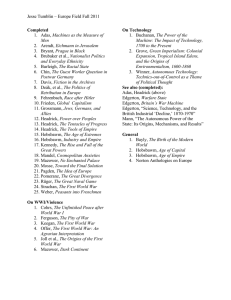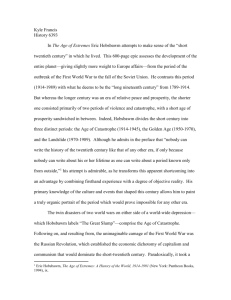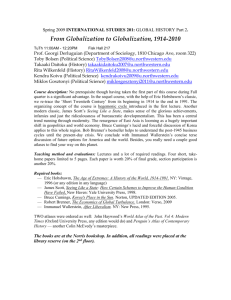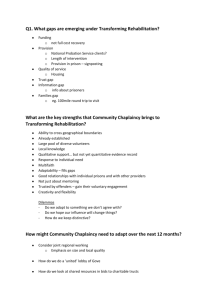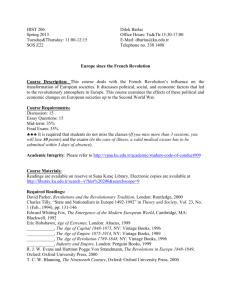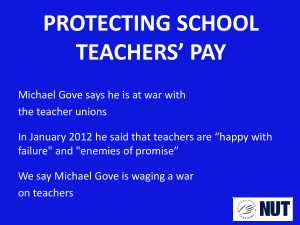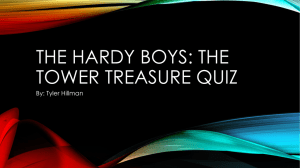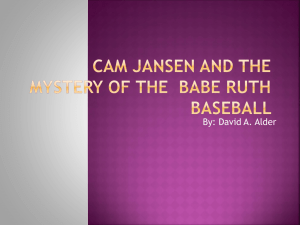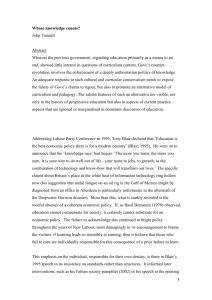online - Birkbeck College
advertisement
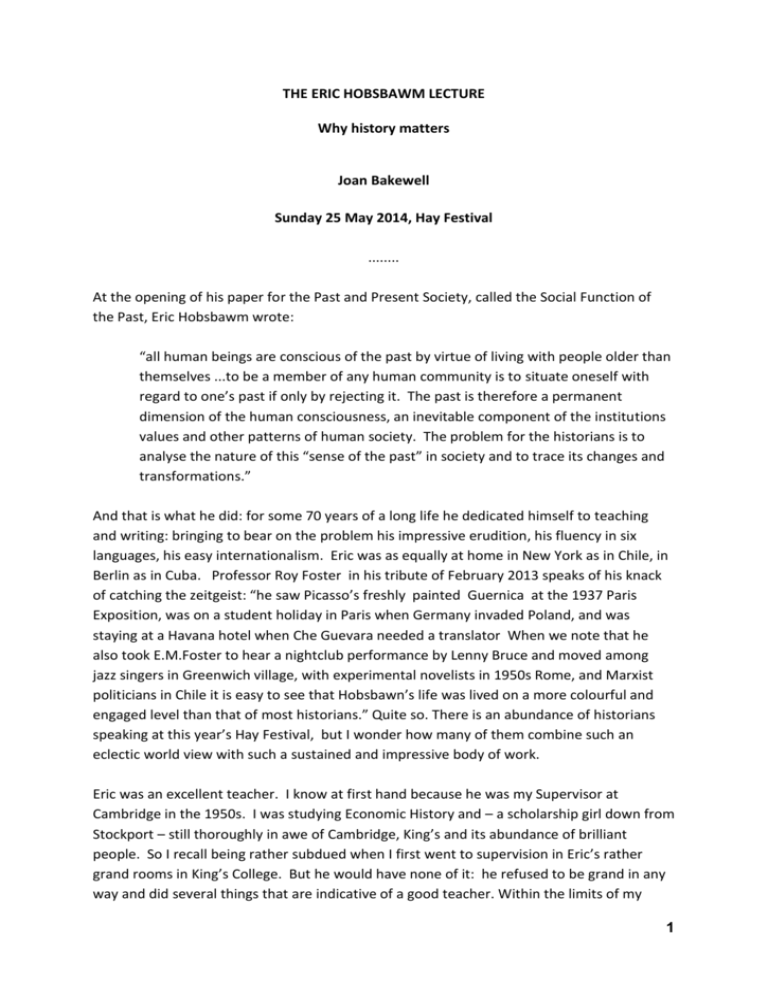
THE ERIC HOBSBAWM LECTURE Why history matters Joan Bakewell Sunday 25 May 2014, Hay Festival ........ At the opening of his paper for the Past and Present Society, called the Social Function of the Past, Eric Hobsbawm wrote: “all human beings are conscious of the past by virtue of living with people older than themselves ...to be a member of any human community is to situate oneself with regard to one’s past if only by rejecting it. The past is therefore a permanent dimension of the human consciousness, an inevitable component of the institutions values and other patterns of human society. The problem for the historians is to analyse the nature of this “sense of the past” in society and to trace its changes and transformations.” And that is what he did: for some 70 years of a long life he dedicated himself to teaching and writing: bringing to bear on the problem his impressive erudition, his fluency in six languages, his easy internationalism. Eric was as equally at home in New York as in Chile, in Berlin as in Cuba. Professor Roy Foster in his tribute of February 2013 speaks of his knack of catching the zeitgeist: “he saw Picasso’s freshly painted Guernica at the 1937 Paris Exposition, was on a student holiday in Paris when Germany invaded Poland, and was staying at a Havana hotel when Che Guevara needed a translator When we note that he also took E.M.Foster to hear a nightclub performance by Lenny Bruce and moved among jazz singers in Greenwich village, with experimental novelists in 1950s Rome, and Marxist politicians in Chile it is easy to see that Hobsbawn’s life was lived on a more colourful and engaged level than that of most historians.” Quite so. There is an abundance of historians speaking at this year’s Hay Festival, but I wonder how many of them combine such an eclectic world view with such a sustained and impressive body of work. Eric was an excellent teacher. I know at first hand because he was my Supervisor at Cambridge in the 1950s. I was studying Economic History and – a scholarship girl down from Stockport – still thoroughly in awe of Cambridge, King’s and its abundance of brilliant people. So I recall being rather subdued when I first went to supervision in Eric’s rather grand rooms in King’s College. But he would have none of it: he refused to be grand in any way and did several things that are indicative of a good teacher. Within the limits of my 1 obvious ignorance he credited me with knowing more than I actually did. He also taught by questioning. What are we to make of....? How do you think that…? He insisted on making it a conversation. Finally and taking me totally by surprise he declared that some concept I had offered up for his consideration was indeed worth just that. What he said next, that came as a shock: “I think that’s a very good concept: would you mind if I used it. Have I your permission to refer to it?” I had never before encountered the idea of a scholar asking a pupil’s permission. In the stunned shock that followed I completely forgot to register what the concept was. I am still seeking it out whenever I read his work. Eric Hobsbawm defined history as “in the broadest sense about how and why homo sapiens got from the Palaeolithic to the nuclear age.” He was a believer in the integrated nature of history, regretting “the almost total failure of history to emancipate itself from the framework of the nation state.” Throughout his life he produced a rich trawl of outstanding historical writing, climaxing in the great works of his last 30 years, the three books that chart the history of the long 19th century – The Age of Revolution, The Age of Capital and The Age of Empire, and the fourth volume of the quartet that tackles the 20th century – The Age of Extremes. Later I discuss why these works offer particular insight for our own times. But I also want to examine some of the changes to education currently going ahead in this country that would engage his severest attention and analysis. But let me begin with the undoubted good news: there seems to be an abundance of history around. At this festival alone there are some 66 history-related events, and 25 fictional events that have historical settings. The television channels are full of history series: neat historical niches like the Georgians, the Plantagenets, the Crusades, the Tudors, viewers’ enthusiasms have made celebrities of their presenters – Mary Beard, Bethany Hughes, Lucy Worsley and David Starkey. And even in the further reaches of cinema fantasy there are films claiming to be rooted in actual events – Spartacus, Pompeii, the Borgias. In the realm of fiction/factual writing we have, among others, the work of Robert Harris – especially his major Cicero trilogy – and the two Booker- winning novels by Hilary Mantel – Wolf Hall and Bring up the Bodies. These are books rooted in their authors’ dedication to historical facts but illuminated by their intelligent imaginative recreation of the past. In our journey from the Palaeolithic to the nuclear age, history – at least as recently taught in this country – has often found safe haven in certain comfortable subjects which it visits again and again: the Tudors, the rise of Hitler and the Nazi regime – and most recently and spectacularly World War One. In 2002 the government approved a sum of £53 million to be spent in commemoration of World War One, and a further £6 million from the Heritage Fund. The BBC is delivering 2,500 hours of World War One programming. A case of overkill that threatens to rival the event it commemorates. We have seriously to consider whether so much concentration on one subject is not a distraction from other subjects of equal 2 historical moment: the history of financial crashes, for example. But there is one arena in which the commemoration offers a unique and rich opportunity: there are still living those whose family members – fathers, brothers, sisters too – remember the stories they told, and still have a hoard of frail letters and postcards that the world doesn’t know about. This is the first hand evidence that history needs: these shreds of recollection, of sadness, panic, fear and regret go to make up the texture of histories now being told for the first time. But now let us consider history as part of the national school curriculum: is there enough and is it the right kind? Michael Gove arrived in 2010 as Secretary of State for Education and has scarcely drawn breath. Almost at once Simon Schama was recruited as government adviser on history and quickly set out his stall: it was his view that no pupil should be able to abandon the study of history at 14. What’s more he suggested adding time for history in the curriculum as a pre-condition of its rescue from fragmentation. He argued for children to be given a timeline, declaring “that there is no coherence without chronology.” And he went further declaring that history gives us roots to today’s world and the current situation of our own country. He put it in his usual bravura style: “ that the seeding of amnesia is the undoing of citizenship.” Simon Schama’s hopes were to be disappointed: Today history in state schools is not compulsory for 14-16 year olds. If pupils take a two-year key stage three, and do not opt for history, their study of the subject ends at 13. However most schools still operate a threeyear key stage three so students will study history until 14. Gove’s new history curriculum disappointed too: the first draft published in February 2013 focussed most emphatically on British history – “our island story” as it was represented, suggested that five to seven-year-olds should be familiarised with the concept of the nation, civilisation, monarchy, parliament and democracy, seven to 11-year-olds would be taught British History from the Stone Age until the Union of Parliaments in 1707, while 11 to 14year-olds would cover 1707 to 1989. The reaction was uproar among teachers and academics, though some historians – David Starkey and Niall Ferguson –were said to approve: both of them, as we know, are of a combative disposition. 96% in a survey of secondary teachers taken by the Historical Association said it was overprescriptive and that the list of famous figures needed amending. In Gove’s hierarchy Christina Rossetti was in, Charles Darwin was out. Simon Schama called it “1066 without the jokes.” There was a rapid rethink at the Department. In the second draft presented in May last year mandatory requirements were softened into suggestions: compulsory content has been drastically stripped back. Now there is more 3 space for world history: children at primary school will be under less pressure to gallop from the Stone Age to 1707. Charles Darwin is one of the new names included for older children for the first time. But Michael Gove stood by his vision: “There is”, he told Parliament, “a clear narrative of British progress with a proper emphasis on heroes and heroines from our past.” There were to be other fights ahead. In his autobiography Interesting Times, Eric Hobsbawm wrote: “More history than ever is today being revised and invented by people who do not want the real past but only a past that suits their purpose. Today is the great age of historical mythology. The defence of history by its professionals is today more urgent in politics than ever. We are needed.” Historians were certainly needed when it came to the next of Michael Gove’s history wars. I, like many others, share concerns about some history teaching: episodes of history unrelated to their chronology, large of slabs of important change often seeming to be neglected: and relatively trivial classroom play – period costumes for example – given undue emphasis. I, like Gove, let rip in the media. On one breakfast programme on LBC I sounded off about how children were growing up with no knowledge of the 17th century, the Civil War the execution of Charles I, the rule of Cromwell – swooping generalisations on my part based on scant exchanges with my grandchildren. Within days I received an irate letter from a history teacher in Yorkshire enclosing some 20 letters from her pupils, each one explaining about the Civil War, the execution of Charles 1 and the rule of Cromwell. By way of apology I invited the entire class down to London for a visit to the Houses of Parliament, via Whitehall palace – site of Charles’ execution - and the statue of Cromwell on Cromwell Green. Michael Gove let rip in the Daily Mail, where in January this year he enumerated why history matters so much in today’s world: it’s a definition Eric Hobsbawm, the Marxist historian, could easily agree with: “issues of great power rivalry, migrant populations on the move, rapid social upheaval, growing global interdependence, massive technological change and fragile confidence in political elites.” Unhappily the Secretary of State for Education then went on to make political capital out of World War One, condemning the “unhappy compulsion on the part of some to denigrate virtues such as patriotism, honour and courage....and condemning the “left wing myths that the Battle of the Somme was a misbegotten shambles.” This is a government spending all that money and not getting the unqualified praise it wanted. Michael Gove continued the attack: “although it was a uniquely horrific war...it was “plainly a just war” and he challenged the view that the Battle of Somme – 20,000 killed on the first 4 day – was a futile loss of life, referring to the military historian William Philpott’s view of it as “a precursor of allied victory.” The target for his attack included the hugely popular television comedy series Blackadder – whose last episode closed with one of the most poignant and memorable images – an image conjuring patriotism, courage and honour from the wretched misery of World War One. Faced with such an attack, historians were indeed needed: when broad generalisations involving lots of abstract nouns and slack references to profound theological debate – such as Aquinas’ theory of “the just war” – we are merely at the start of what historians do best: provide research and detailed evidence. Professor Sir Richard Evans stepped forward. He was irked into intemperate language of his own suggesting “perhaps Gove should attend some history lessons taught by the professionals he so belittles so he can learn how to read and cite sources properly.” Professor Evans then went on to cite the views of Niall Ferguson, Max Hastings, and the late Alan Clarke – none of whom belong to any left wing conspiracy but all of whose works express strong – and evidence-based – criticism of Britain’s role in World War One. I think there is great gain to be had from such rows: first, the publicity they provoke sets people talking; second, it serves to dispel complacency about the continuing coverage of World War One, which will deluge us for the coming four years. It also gives an open opportunity in the pages of the Daily Mail, no less, to demonstrate that those who make grand claims – on either side of a historical argument – must seek consistent and credible evidence for the claims they make. That is how history works: that is why history matters. It is how the interplay and record of past events takes shape. Otherwise clichés to suit a contemporary mood are all that survive. Hobsbawm himself gave a fine example of true historical scholarship in a paper published in 1952 (about the time he was to teach me at Cambridge). It concerns the Machine Breakers. Now the term ‘Luddite’ is known to us all: it means, doesn’t it, someone who opposed technological development and this held back inevitable economic change? It derives – and even Wikipedia calls it a rumour – from Ned Ludd, supposed breaker of stocking frames in 1780. Hobsbawm’s paper – The Machine Breakers – puts the term in its proper historical perspective and opens up a whole world of pre-industrial working people – miners, knitters, Spitalfield weavers, farm hands, spinners, printers – engaged on an extensive scale from the mid 18th century onwards in getting better working terms and conditions as factories and mines expanded. They carried broad public approval for their activities: evidence. Few were ever denounced. Hobsbawm calls the movement “collective bargaining by riot” and saw it as the expression of workers’ early attempts to confront industrialisation. As such 5 the article is evidence based, its authorities cited – an impeccable piece of historical scholarship that adds to our wisdom about the past and our insights into the present. Behind a single word – Luddite – a whole hinterland of history opens up. Part of our island story, indeed! Just such work is increasingly under threat from radical changes to our university system. For some 60 years Eric Hobsbawm was associated with Birkbeck, University of London – the College that offers full-scale degree courses and awards degrees for people studying parttime. For 10 years he was its president. And in 2013 I succeeded him there. I am as worried as he would be by what is happening, especially as it affects the humanities. We live in times when the tectonic plates of education are shifting in ways that are transforming university life for ever. The reforms are well underway and the assumptions on which they are based risk becoming the received wisdom of a latest generation of university chancellors, governing bodies, and increasingly university-owning companies. University education is being privatised. On 8 April this year a debate was held, in the House of Lords, about Higher Education in the UK. It was moved by Lord Ahmad of Wimbledon, the government frontbench spokesman in the Lords for Business, Innovation and Skills. That’s because Higher Education no longer comes under the Department of Education. Since 2002 it has been the business of BIS. And business it certainly is: Lord Ahmad’s language – as is appropriate for someone with a background in asset management – measured university success entirely in economic terms. He cited statistics that show around 20% of economic growth between 1982 and 2005 came as a direct result of increased graduate skills. “A 1% increase in the share of the workforce with a university degree raises long-term productivity by between 0.2% and 0.5%.” In detailing such triumphs he explained that: “In tough times we are protecting science (“There is extra funding over four years for teaching expensive subjects such as science technology and engineering).” His measure of success was also financial: “In the wake of our reforms total overall university income in England has gone up from just under £23 billion in 2010-12 to nearly £24.3billion in 2013-14.” The government is thrilled with this. He went on: “Universities have become a source of exciting new companies. In 2012-13 more than 3,500 new start-up companies were established by staff and recent graduates. In total the survey found that UK universities earned an impressive £3.6 billion in 2012-13 through business and community activities.” The entire value of major university research was to be measured in financial, economic terms. The direction of what Lord Ahmad calls “this historic shift” was given powerful send-off by two major policy moves both recommended by the 2010 Browne’s report. Together these 6 moves are intended to transform what had been a publicly funded public good for the benefit of all into a market-driven structure supplying a commodity – degrees – to be purchased by consumers, i.e. students. Move One was the almost total withdrawal of the current annual block grant that government made to universities to underwrite their teaching. In 2010 that stood at around £3.9billion. It was abolished entirely from band C and D subjects – roughly arts, humanities and social sciences – and in substantial part from band A and B subjects, roughly medicine and natural sciences. It signalled a major retreat of the state from direct support in the field of university study. What’s more it indicated to private providers that our established universities – those that had won our international reputation – had lost the very subsidy that gave them the edge on rival universities around the world. The field was open to private providers to step in. The second recommendation – and the one that got all the headlines – was that students would have to pay towards their education in fees. Originally this had been conceived by David Blunkett as an upfront student contribution of £1,000 taken as a loan, but now the cap was raised to £3,000 a year and then £9,000. The fee we now charge our students is over twice the average tuition fee in public universities in the United States. Taxpayers’ money would fund these fees as loans up front, and then recoup the money steadily as graduates began to earn. Success is to be judged by how much customer approval a university earns. The theory is that measuring levels of student approval will drive the less successful out of business and thus implicitly improve the standards of university provision overall. Anyone who knows anything about learning, one-to-one teaching, and scholarship knows this is highly ideological and highly problematical. But it is the direction we are taking. Already the system is coming under heavy strain. The system of student loans is beginning to unravel. the government minister David Willetts has conceded that write-off costs have reached 45% of the £10 billion in student loans made each year: this threatens to nullify any savings to the public purse. The reason is clear: there are fewer jobs for graduates, higher numbers of them are unemployed and those who do get work are less well paid than government projections indicated. How many graduates do you know working in bars and restaurants, cleaning cars, stacking shelves in supermarkets, working on zero contracts? This is not how the free market in higher education is supposed to work. Universities are no better off: students are worse off and the government will end up having to pay even more to fund higher education than they did under the old system. Other changes, drawing less attention to themselves, have been going on. The term “University” – the reputation that goes with that word – as a place of learning, a coming together of scholars to study, to engage in research and to award degrees – was, under the terms of the Further and Higher Education Act of 1992, vested in the Privy Council. 7 However more recently there has been established an alternative way of gaining such a designation. The Department of Business Innovation and Skills (BIS) now has the power to allow the use of the word “University” in a company name: as for example the BPP University registered in 2013. There is surprisingly no requirement for such so-called universities to offer a spread of subjects, or to offer postgraduate study. If such an existing college is subject to a private capital buy-out it will still be able to retain its precious degree awarding status. Students at such private institutions – whether they are for profit or not-for-profit – are eligible for government loans. And the amount of public money going as loans to such private institutions has trebled in one year – and now exceeds £100 million. The number of students studying with private colleges on unregulated courses has also doubled in one year. A large hunk of that public money involved went to The Greenwich School of Management which is owned by the private equity fund Sovereign Capital. A co-founder of Sovereign Capital back in 2001 was John Nash, now Lord Nash and since last year the Government’s Minister of State for Education. The privatisation of higher education with its capacity to make private profit from public money is well entrenched within government. Does this matter? It certainly does: these institutions are exempt from many of the obligations of public institutions. According to BIS in 2012 there were some 670 privatelyfunded institutions with a total of 160,000 students, existing outside a satisfactory regulatory framework. They do not have to observe the same limits on student numbers and are not obliged to publish statistics on recruitment or completion rates. The greater competition encouraged in the university sector under the new funding regime enhances the possibility of institutional failure. British businesses fail, they get taken over – we know that. Were such failures to happen in the newly designated university sector it would tarnish the high reputation of British higher education not just here but across the world, as well as letting down students and academic staff. So how does this affect history and the evidence-based analysis that was so close to Eric Hobsbawm’s heart. Interestingly the new strategy is throwing up a challenge from within its very own reforms. Its treatment of students as consumers and its implied invitation to them to voice their judgement is coming home to roost in just Hobsbawm’s area of expertise: economic history. At the start of the first of his great sequence of books – The Age of Revolution – Hobsbawm wrote that “the profundity of the revolution that broke out between 1789 and 1848 forms the greatest transformation in human history since remote times when men invented agriculture and metallurgy, writing, the city and the state: that revolution has transformed and continues to transform the entire world:” That transformation is called capitalism and it now coming under increasing strain and criticism. Since the crash of 2008 we find the 8 world’s banking system no longer fit for purpose and we need to know why. Even the Queen asked “why did no one see it coming.” More people than the Queen want to know. But university economic courses are not telling them. Earlier this month in a manifesto signed by 42 university economics associations across 19 countries students complained at a dramatic narrowing of the curriculum.” They complain that courses follow only one way to do economics, basically to follow the neoliberalism of the Chicago School’s free market theories. In Manchester the student association went one step further setting up their own lectures, organising evening classes about the nature of an economic bubble, and of an economic crash: the temporary lecturer of that course did not have his contract renewed. But the protests persist. With the global success of Thomas Piketty’s book Capital in the 21st Century, it is heartening that students themselves are demanding that lecturers with broader outlooks tackle new and challenging texts. The spirit of enquiring, of evidence-based analysis is demanding to be heard. The future of university study may not be so easily corralled into the prevailing economic model, one that so obviously betrays the original and inspiring purpose of university study. I welcome the move. Eric Hobsbawm would be delighted. 9
